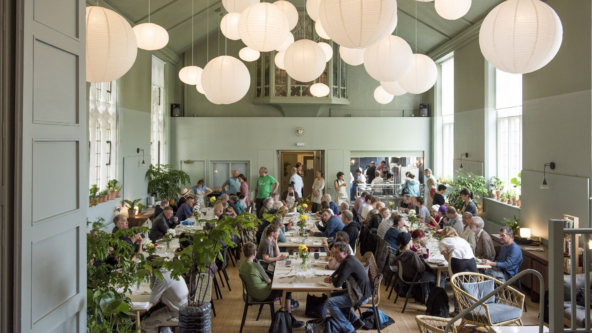Emma Ryan recently returned from a month-long volunteering placement with Lao Disabled Women’s Development Centre. Read about her experiences below.
Thanks to The International Exchange – an initiative that places volunteers with social enterprises in developing countries – Emma Ryan was given a month-long assignment with a charity in Laos in south-east Asia. To use its official name, the Lao People’s Democratic Republic shares borders with China, Myanmar (Burma), Thailand, Vietnam and Cambodia.
Emma was matched with the Lao Disabled Women’s Development Centre. The Centre houses full-time disabled staff and students who come to live, study and work for six months at a time. During this assignment, Emma was encouraged to use the skills, experience and can-do attitude gained during throughout her career.
Week 1: the journey begins
I used to think about charity as helping people who can’t help themselves. But meeting the students at the Lao Disabled Women’s Development Centre quickly taught me what’s wrong with that perception. The students I met were some of the most resilient, capable, brilliant people I’ve had the privilege of knowing.
The students come to learn sewing, paper-making and other skills, while being offered a chance at education, training and support. The Centre empowers women to build lives for themselves by understanding their disability and their rights. The students come from some of the most rural parts of the country, with some unable to read and write. Their time spent at the Centre can really change their lives.
Every one of the 50 students worked incredibly hard, and refused to allow their disability to limit their lives. It was inspiring – and I instantly knew I was going to get a lot out of my brief time there.
Getting to grips with my role
Coming to Laos was an incredible opportunity – but it wasn’t a holiday. I had a job to do. I was there to use the knowledge I’ve gained in my work at Octopus to help the Centre. The main goal was for me to formulate a strategy for long-term fundraising and find ways the Centre can open their doors to more women and young people.
On top of this, I planned to write proposal documents in English to apply for grants, and promote the Centre and what it offers in every way possible.
Finding additional funding was critical for the Centre, because it gave students far more opportunities. They could learn skills, find employment, and set up their own businesses, as well as learning more about their own disabilities and helping others.
Finding my groove
Over the first week, I began to find my groove. I started with a simple but important task; replacing the billboard outside the Centre. Tourists passed by all the time, so it was a great opportunity to highlight what went on there – but the faded sign wasn’t getting noticed. I briefed a local printing firm to make a new one.
I suggested some improvements to the Centre, such as repainting, and also drafted a proposal for a new Korean grant to take more students. After that, the tasks started mounting. A big part of my job was to write funding proposals and applications in plain, persuasive English. Most of these went out to foreign governments.
But while I was out there, I really wanted to use my initiative to make a difference. One thing I noticed immediately was that the Centre wasn’t very accessible – even though its purpose is to support disabled women. Though they were due to receive some money for redeveloping the building, it wasn’t enough. I quickly drafted some letters to international embassies based in Laos, asking for help.
Not bad for Week One!
Week 2: understanding disability
Throughout my second week, I focused on raising awareness about the Centre. The women here put a lot into disability training. Their aim is for everyone to understand disability better – especially when it comes to healthcare. They equip the women here to get the most out of their doctor appointments, and be ready to ask questions.
One of the residents, Miss Z, has a disability in one leg. Unfortunately, due to a lack of understanding around her disability, Miss Z lost her child during pregnancy. The doctors didn’t warn her that her impairment would have an effect on her pregnancy.
Miss Z described the situation to me with such grace. She wasn’t bitter that she hadn’t been advised incorrectly – she was simply sad at what had happened and resolved to make sure this never happens to anyone else. Training surrounding disability was the only way forward.
A small victory
The Centre also trains women in a range of handicrafts. The products are sold in their showroom on-site, and in an ethical store in the capital. Each item was eco-friendly and sustainable. The income produced from sales is used to pay the staff salaries, provide food for those that live here, and so on. It’s an essential part of the Centre’s finances. Bulk orders are rare; mostly, the products are sold individually, and the margins are small.
I thought it was unfortunate that all this amazing work wasn’t advertised on their website. So, I bought a lightbox to take decent pictures and upload them in an ecommerce style.
The setup was simple enough that anyone could use it. That meant everyone could help photograph and list products – an easy and effective way to boost the Centre’s income and show off what they do here.
Week 3: the home stretch
Week 3 arrived, and I had approximately 27 things that needed doing. I spent the majority of the weekend writing a six-page list that formed the base of my final report.
I had a two-hour meeting with the Korean company that was planning to contribute $50,000 in student funding. It was an incredibly tough few hours. The meeting had to be conducted in English as the main contact was Korean and didn’t speak Lao.
Afterwards, we spent another three hours redrafting the proposal. One thing the company wanted to see was a record of attendance.
This was entirely logical to me – if I was providing funding for 50 students, I’d want to know that 50 students were turning up each day. But the Centre staff were confused.
They told me that the project was signed off by the Government, so that was proof. They seemed upset that I was suggesting that not everyone would be taught. It was quite a tense moment. I tried again, rephrasing what the Korean company were asking for.
Eventually, it clicked. I was given a register, which they’d had all along. Turns out, it was language that was getting in the way. We got there in the end!
Feedback
During my stay, three staff members attended English lessons in the mornings at a local school. They had to do a final presentation on Monday, and I offered to help them prep. The project they were working on was about setting up a support centre for disabled people to visit or call to learn about the services they offer.
I gave them a hand with their pronunciation of various English words and they got their certificate on Thursday. Nice! It included a feedback sheet with areas of strength and of improvement. I went through this with them as well, as they didn’t know what it meant.
It made me think a lot about the feedback giving at work. It’s something often acknowledged that we need to get better at. It’s easy, especially when you’re busy, to fire off emails which might not be taken in quite the way they were intended.
Week 4: saying goodbye
The Centre put on a Baci ceremony before I left. It’s a beautiful, traditional Lao way of saying goodbye and good luck.
I was very emotional. I knew I’d miss the happiness at the Centre: the calm, gentle, helpful nature of the Lao people, and the positivity of the women there.
I’ll always look back and smile at some of the amazing interactions I’ve had. I hope the fundraising efforts will make a difference in the lives of the people I met. I ended my experience with some last-minute donations: a stack of books, multiple boxes of chocolates, and several million Laotian Kip.
Measuring my impact
Much of the work I did at the Centre was long-term, so I didn’t get to see the impact while I was there. But I was lucky enough to see the first-ever group of students graduate. It really brought home what this work means.
Some of these students went on to work in the Centre and help others. While others were given tools and support to start their own businesses in villages around Laos. I saw how the Centre went far beyond what is required of them to make sure their students are set up for life.
More funds will create more places for students, and help the Centre integrate with other charities to provide courses on a wider scale. Eventually, it could become a hub for people with disabilities from across the country. It’s an incredible initiative to be a part of.
“The most challenging – and rewarding – thing I’ve ever done”
My assignment from TIE was easily the most challenging thing I have ever done – and the most rewarding. I was catapulted into a placement half-way round the world, into a culture completely different to my own, where I had to interact with people in a language I’d never even heard spoken before.
The experience showed me that I was more resilient than I ever thought. It gave me an enormous amount of perspective and appreciation for life. And it made me a lot calmer!
Thank you to TIE and everyone that has supported me throughout my trip. When you’re alone for a month making your own way in a new, challenging environment it’s great to know that the difference you’re making is worth it. It’s one experience I’ll never forget.
Follow the link to find out more about the great work of The International Exchange, and you can make a donation to the Lao Disabled Women’s Development Centre


